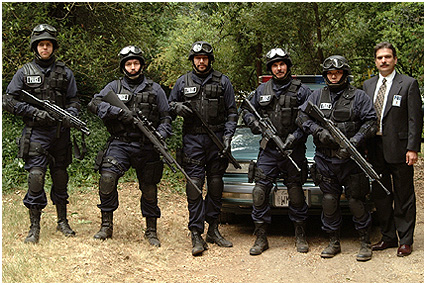– You are 17,600 times more likely to die from heart disease than from a terrorist attack
– You are 12,571 times more likely to die from cancer than from a terrorist attack
— You are 11,000 times more likely to die in an airplane accident than from a terrorist plot involving an airplane
— You are 1048 times more likely to die from a car accident than from a terrorist attack
–You are 404 times more likely to die in a fall than from a terrorist attack
— You are 87 times more likely to drown than die in a terrorist attack
– You are 13 times more likely to die in a railway accident than from a terrorist attack
–You are 12 times more likely to die from accidental suffocation in bed than from a terrorist attack
–You are 9 times more likely to choke to death on your own vomit than die in a terrorist attack
–You are 8 times more likely to be killed by a police officer than by a terrorist
–You are 8 times more likely to die from accidental electrocution than from a terrorist attack
– You are 6 times more likely to die from hot weather than from a terrorist attack
(Moreover, the chair of the 9/11 Commission said that the attack was preventable).
Indeed, much of our debt is due to the wars in Iraq, Afghanistan, Libya and elsewhere.
And yet the top American military and intelligence officials say that debt is the main threat to our national security. See this and this.
So by over-reacting, we are causing real, substantial and lasting damage to our country. (It is admitted by Bush, Cheney and others that the Iraq war was actually about oil, and the Afghanistan war was planned before 9/11, but this essay takes at face value the government’s claims that the wars have been for self-defense.)
Reason noted in 2006:
Already, security measures—pervasive ID checkpoints, metal detectors, and phalanxes of security guards—increasingly clot the pathways of our public lives. It’s easy to overreact when an atrocity takes place—to heed those who promise safety if only we will give the authorities the “tools” they want by surrendering to them some of our liberty. As President Franklin Roosevelt in his first inaugural speech said, “The only thing we have to fear is fear itself— nameless, unreasoning, unjustified terror which paralyzes needed efforts to convert retreat into advance.” However, with risks this low there is no reason for us not to continue to live our lives as though terrorism doesn’t matter—because it doesn’t really matter. We ultimately vanquish terrorism when we refuse to be terrorized.
In April, Reason pointed out:
“Many people will focus, much of the time, on the emotionally perceived severity of the outcome, rather than on its likelihood.” They add, “With respect to risks of injury or harm, vivid images and concrete pictures of disaster can ‘crowd out’ the cognitive activity required to conclude and consider the fact that the probability of disaster is really small.” Activating the emotional centers in the amygdala shuts down the operation of the executive functions of the pre-frontal cortex. Taking advantage of this flaw in reasoning, the researchers observe, “In this light, it should not be surprising that our public figures and our cause advocates often describe tragic outcomes. Rarely do we hear them quote probabilities.” In other words, politicians and activists deploy sob stories to scare the public into demanding regulations on activities they dislike.


No comments:
Post a Comment